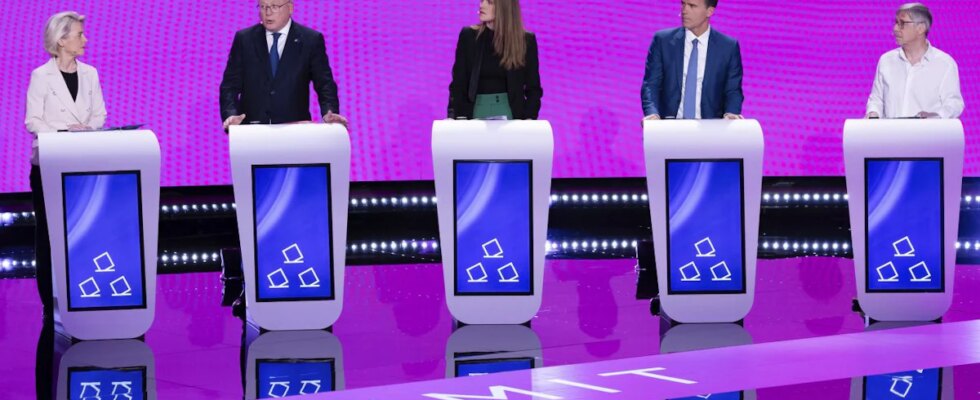Nicolas Schmit even managed to catch his opponent twice, but you had to listen carefully. And background knowledge was needed, as with most of the topics that came up this Thursday afternoon in the European Parliament in Brussels. Schmit, 70, Luxembourger, EU Commissioner for Social Affairs and leading candidate of the European Social Democrats in the European elections, said to Ursula von der Leyen: “I wonder what ‘pro Europe’ means to you!” Because when he looks at Italian Prime Minister Giorgia Meloni and her positions, he cannot imagine that her idea of Europe is the same as von der Leyen’s. “We need clarity on this,” said Schmit.
One would have loved to hear an answer to this question. Instead, the incumbent Commission President from Germany, who is running for a second term, simply reiterated her criteria for working with parties to the right of her political homeland, to the right of the CDU and the European People’s Party. It is important to define clear criteria as to who you want to work with, said von der Leyen. There are three of them: “The first is pro-Europe, the second is pro-Ukraine, i.e. anti-Putin, and the third is (…) pro-rule of law.”
45 seconds per answer
That illustrated quite well what was happening in the elaborately designed plenary hall: a loud scratching on many different surfaces. This was the only one official election debate of the top candidates in parliament, hosted by the European Broadcasting Union, which is otherwise best known for organizing the Eurovision Song Contest. A presenter from the Flemish broadcaster VRT and a presenter from Czech television led the five candidates through six topics, from defense to digital, taking turns interviewing them with young first-time voters who were sitting in the hall or who were tuning in from one of the European capitals. 45 seconds per answer, for each of the five three 30 second special speaking rights.
EU politics in fast forward. A kind of empty phrase party, where at the end the main question is who is supposed to have learned the wiser from it. It was more of an individual questioning than a debate. Von der Leyen took advantage of this in her presidential manner, where you never know for sure whether she is a candidate or the head of the Commission. She calmly listed her successes and spoke as if at a press conference.
What will now become of the Green Deal, the EU Commission’s ambitious climate protection program of recent years? The legal framework has been created to achieve climate neutrality, the all-important roadmap. “And actually,” said von der Leyen, “now we are where we have to implement it.” That’s why we have a dialogue with the industry and with the farmers in which we ask them: “What do you need to achieve climate neutrality?”
People are abandoned in the desert
Arguments rarely arose. It took an hour for things to get heated. That’s when the Green top candidate Terry Reintke attacked her liberal rival Sandro Gozi. The Dutch VVD, which is preparing to form a government with the far-right Geert Wilders, also belongs to his Renew faction. Gozi should finally make a clear statement and demand that the Dutch be excluded from the faction, said Reintke, as this must have consequences. The Italian liberal replied that there was still no new Dutch government and that they would seek talks after the election on June 10.
:Far-right faction excludes AfD MPs
The parliamentary group “Identity and Democracy” no longer wants to be associated with its German parliamentary group colleagues. They had unsuccessfully resisted the expulsion and only wanted to sacrifice their top candidate for the European elections, Maximilian Krah.
Another hit was scored by Schmit, who had so far appeared rather pale in the election campaign, was only able to increase his popularity moderately and was also noticed on Thursday mainly with sentences such as: “Without democracy there is no European Union.”
He described the consequences of the refugee deal that the EU concluded with Tunisia. Investigative research a network of European media recently revealed how Tunisian security forces arrest suspected illegal migrants and people they believe to be illegal migrants and abandon them in the desert – financed, equipped and trained by the EU. “Don’t tell us this is about fighting smugglers,” said Schmit. It’s about fighting migrants “who are thrown into the desert and many of whom die.”
Instead of an exchange of blows, the next topic was already waiting
Von der Leyen did not address this directly, she simply listed what the EU is doing to help the countries of origin and transit. Investments are being made in these countries to create good jobs locally, to enable people to earn an income and to encourage them to stay. Secondly, invest in education so that better educated people can enter the European Union legally. “I think this is the way to deal with these countries and not to exclude them and slam the door,” said the Commission head.
That would have been a point where one would have liked to hear more. Room for controversy, for an exchange of blows that makes the political differences clearer. But the next topic was already waiting.
In any case, there is something artificial about such a debate: There were five top candidates on the stage who are officially running for the presidency of the European Commission. As is well known, the heads of state and government nominate a person for this role after the election. Of those present, von der Leyen alone has a chance of winning the office, which she has now held for almost four and a half years. How fitting that when she arrived at Parliament she simply walked past the cameras and microphones without looking. Although she then said during the debate that campaigning for a second term was “one of the best things that ever happened to me.”

